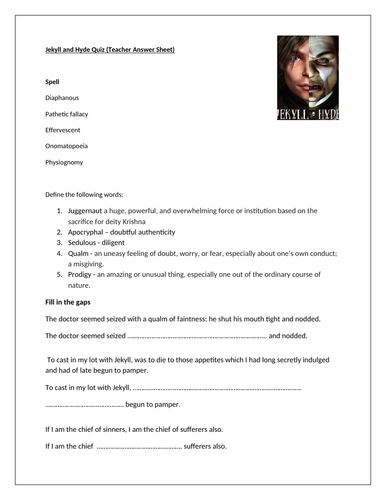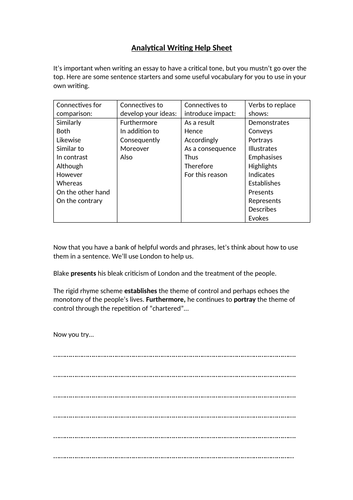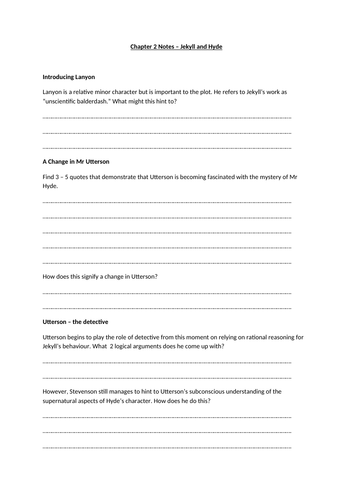88Uploads
15k+Views
7k+Downloads
All resources

Macbeth 1.6 Summary and Function Notes
A powerpoint focusing on Macbeth 1.6, including summary notes and an activity identifying the function of the scene with a focus on dramatic irony and its effect. Suggested answers provided.
Suitable for all GCSE Literature specifications or high ability Year 9.

Macbeth 3.5 Summary and Notes
Free powerpoint resource with a summary and note on the source origins. This scene was not written by Shakespeare and this powerpoint explains the differences in style.
Useful for any GCSE Literature specification or high ability Year 9.

Macbeth 5.2 Summary and Analysis
A fully resourced mini lesson on Macbeth 5.2. The lesson includes:
Powerpoint with summary, questions and annotation tasks
Teacher notes for annotation (on powerpoint)
Student annotation sheet.
5.2 is a short scene focusing on the progress of the battle and Macbeth’s mental state. Easily glossed over as a plot filler scene, this resource ensures students will be prepared should it come up as an extract.
Perfect for all GCSE Literature syllabuses or high ability year 9.

Macbeth 5.6 Summary and Function
Powerpoint briefly summarising act 5 scene 6 and offering explanation for function.
A speedy resource to use in 10 minutes or less before finishing the rest of the play!

Macbeth 5.4 Summary and Function Notes
Powerpoint with quick tasks on the short scene 5.4 in Macbeth where Malcolm and his army cut down the boughs from Birnham Wood. Tasks involves summary notes, discussion and notes on function and an opportunity to jot down key quotations.
Whole task will take no longer than 10-15 minutes with reading.

End of Term Fun! Poetry Bingo
Revise poetry terms and your poetry anthology with this fun resource, perfect for end of term activities or a fun way to revise for exams.
This resource includes a poetry bingo card with 20 terms and instructions to play. Suitable for any collection of poems your are using with students at Key Stage 3 or 4. The game could also be adapted for poetry terminology definitions depending on need.

End of Term English Project - Board game!
Turn your favourite book into a board game. Stuck with what to do with your students in the final week of the summer term? Use this powerpoint and handy templates for a week’s lessons of fun. Students can choose any text they have studied with you over the year and create their own board game. This could be a brand new game or something inspired by a classic.
Included is a powerpoint with rules and suggestions, and three templates inspired by monopoloy, snakes and ladders and cluedo. All are left blank so students can adapt. Ie. instead of snakes they could use prospero’s staff

Heaney's The Skunk - Model and Frame
A resource to support writing analytically about Heaney’s The Skunk with further topic sentences on The Otter. Resource includes a model paragraph plus colour coded writing frame with further topic sentences as prompts. Would be suitable for KS4 and KS5, English Literature and Enlgish Language and Literature

Jekyll and Hyde - Utterson - Chapter 1
A worksheet including key quotations from Chapter 1, introducing the character of Utterson. This worksheet encourages analysis, discussion of key ideas and is a useful starting point for a character quotation bank.

Macbeth - Witches Essay Model Response
Macbeth - Function of the witches essay with model answer.
Approximately 1000 word discursive essay about the function and the importance of the witches integrating relevant contextual discussion. The essay covers form, the opening of the play, King James’ fascination with witches, Middleton’s later edits and the witches as catalysts of the plot.
Suitable for GCSE or A Level Literature. Could be used as a style guide, a revision tool or a class marking exercise.

Jekyll and Hyde Quiz!
A 5 round quiz on Jekyll and Hyde perfect for KS4 revision. The quiz tests vocabulary, character and themes, quote memory and analysis. Resource includes answer sheet for first three rounds (rounds 4 and 5 are subjective).

Analytical Writing Style Guide
A handy worksheet for Key Stage 4 students to help them develop their critical style. It provides guidance and examples of analytical language with a focus on connectives, a model and brief task.

Macbeth - Function of the Witches Lesson
A fully resourced lesson with Powerpoint and A3 extract sheets teaching students how and why Shakespeare used the witches in his play. The powerpoint resource goes through key contextual factors affecting Shakespeare’s choices including superstitions, King James’ own belief in witches, and mythology. It also offers opportunities for close analysis in conjunction with the A3 hand out. This is a medley of the most important sections of the play incorporating the witches. Great for extract practice or quote learning.
The lesson builds to students completing an essay on the function of the witches which could be done for homework or in class.
For a model response to this question, please see my shop: https://www.tes.com/teaching-resources/shop/Marianneadams810

Macbeth 1.7 Soliloquy Questions
A copy of the soliloquy from Act 1 Scene 7 and a set of 10 questions to help students’ understanding. Can be used as annotation prompts or for extended writing.
Suitable for all GCSE Literature specifications or high ability Year 9.

Macbeth 1.2 Full Lesson on Character
A fully resources lesson looking at early presentation of Macbeth’s character through analysing the account from the captain. The resource also includes useful contextual information regarding tragic conventions.
This resource includes:
Detailed PowerPoint
Worksheet with table on Macbeth’s character
Suggested answers on a separate sheet - useful support for new teachers and non specialists.
Suitable for all GCSE Literature specifications or high ability Year 9.

Jekyll &Hyde Chapter 2 Worksheet
A worksheet that focuses on characterisation and setting in Chapter 2 of Jekyll and Hyde, encouraging students to find and analyse quotations. Appropriate for all KS4 Literature specifications plus both extract and wider text questions.

Jekyll and Hyde General Quiz
A 2 round quiz, testing both knowledge and quotations from Jekyll and Hyde. Suitable for any GCSE study of the novella. Comprehensive answer sheet also provided.
Perfect for revision, homework or end of term fun!

Jekyll and Hyde transformation essay plans with extract
Jekyll and Hyde extract taken from Dr Lanyon’s Narrative detailing the transformation from Hyde to Jekyll. Extract based question with wider novella question. Colour coded essay plan with key terminology and device identification for extract. Discussion points and key quotations for the wider question along with a model paragraph.
Perfect for in class essay with option for differentiation. Alternatively can be used for revision or homework tasks. Aimed for the Edexcel GCSE Literature spec but suitable for any literature course.

Jekyll and Hyde - Dr Lanyon's Narrative Worksheet
Jekyll and Hyde worksheet on key quotations from Dr Lanyon’s Narrative. The quotations have thematic questions which allow for class discussion but also can be used as annotation points.
The resource could work along side an extract analysis of the transformation itself.
Suitable for in class work with any GCSE Literature class, although some of the questions may be angled more to high ability. Could also be set as revision or homework.

Jekyll and Hyde Extract, Essay Plan and Model
Extract from Chapter 10 of Jekyll and Hyde with an accompanying essay question. Resource includes an essay plan with guidance and a colour coded model paragraph highlighting good practice.
Great as a starting point for an essay, revision or homework.
This extract is taken from The Full Statement of the Case and details the moment when Hyde is on the run, before he asks for Lanyon’s help. The essay plan explores the idea that both Jekyll and Hyde’s characters are present in this extract and therefore both have to be considered.




















